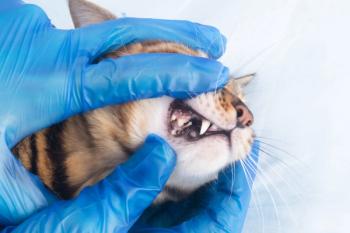
Managing the difficult-to-control feline diabetic (Proceedings)
Pathogenesis, diagnosis, and patient evaluation for a diabetic cat.
I. Pathogenesis
A. Insulin-dependent (rare)
B. Non-insulin dependent
C. Transient
D. How do you distinguish
E. Does it matter?
II. Diagnosis
A. Clinical signs
B. Persistent hyperglycemia
C. Glucosuria
D. Stress-related hyperglycemia
E. Insulin-dependent versus non-insulin dependent
1. difficult to separate
2. often diagnosed by clinical presentation or in retrospect
III. Patient Evaluation
A. Stable versus non stable
1. ketotic
2. acidotic
3. hyperosmolar
4. hydration status
5. eating/drinking
B. Concurrent disease
1. urinary tract infection
2. concurrent endocrinopathies: cushing's disease, hyperthyroidism
3. pancreatitis
4. infections
5. pregnancy
6. reproductively intact
C. Testing
1. CBC
2. Chemistry
a. ketonemia
3. Urinalysis
a. ketonuria
b. bacteriuria
c. pyuria
4. Urine culture
5. abdominal ultrasound
6. feline pancreatic lipase immunoreactivity (fPLI)
7. insulin-dependent versus non-insulin dependent (?) – no good way to differentiate
D. Treatment for the stable animal
1. ketotic versus non ketotic
2. hospitalization versus non hospitalization
3. Goals of therapy
a. correction of clinical signs
b. control of concurrent disease
c. avoidance of emergency situations
(1) hypoglycemia
(2) ketosis/ketoacidosis
(3) hyperosmolality
E. Treatment for the stable feline diabetic
a. diet – low carbohydrate
b. diet + insulin
(1) insulin effects very variable
(2) intermediate-acting; bid
(3) 0.25 U/kg; 1-2 U/cat bid
F. Feed bid with insulin
G. Free choice feeding
H. Exercise/playing
I. Identification and control of concurrent disease
J. Time for initial control: 4-6 weeks
K. Oral hypoglycemic agents
a. chromium and vanadium
(1) trace minerals
(2) insulin sensitizers
(3) ineffective in dogs
b. metformin (biguanide) – not effective in diabetic cats as a sole agent
c. glipizide, gyburide (sulfonylurea)
(1) stimulate insulin secretion
(2) NIDDM
(3) worsening of islet cell amyloidosis
L. Alpha-glucosidase Inhibitors
a. acarbose
b. miglitol
c. complex oligosaccharides that inhibit enzymes in the brush border of the small intestine responsible for digestion of carbs
d. in diabetic dogs: acarbose decreased dose of insulin necessary
(1) diarrhea
(2) weight loss
G. Monitoring the diabetic cat
a. 7-10 days for animal to adjust to insulin
b. Insulin requirements will be higher at home than in hospital, usually
c. Physical examination
d. Weight measurement
e. Resolution of clinical signs, especially PU/PD
f. ketodiasticks
g. home glucometers
h. glucose curves
(1) glucometers
(2) at home versus in hospital – both can be problematic
(3) in-dwelling sampling catheters
(4) continuous interstitial glucose monitoring
-downloadable
-real time (RT) medtronic guardian
i. fructosamine
(1) average blood glucose for the past 2-3 weeks
(2) will miss hypoglycemic events
(3) cannot give information obtained from a glucose curve
H. Specific problems with diabetes management
1. undiagnosed endocrinopathies
a. Hyperthyroidism
b. Cushing's disease (uncommon)
c. Acromegaly (rare)
2. undiagnosed infections
a. urinary tract
b. abscesses
c. respiratory
3. other concurrent illnesses
a. pancreatitis – chronic/acute
b. neoplasia
4. suspect when insulin dose > 1.5 U/Kg and animal is not under control
Newsletter
From exam room tips to practice management insights, get trusted veterinary news delivered straight to your inbox—subscribe to dvm360.



